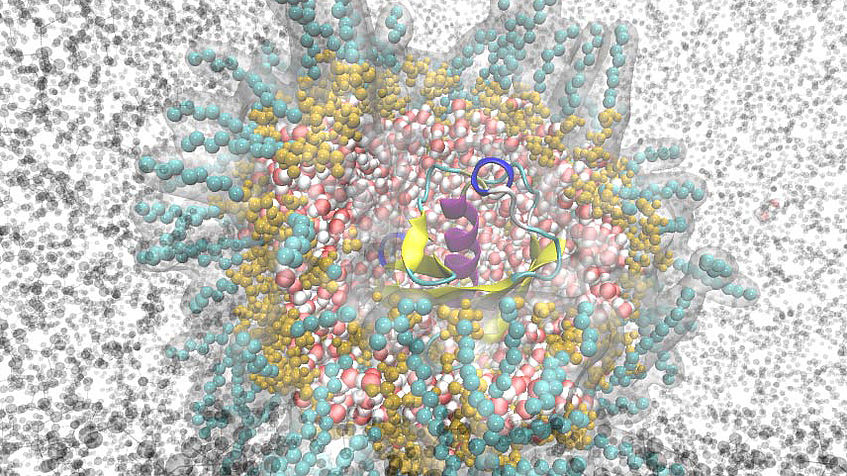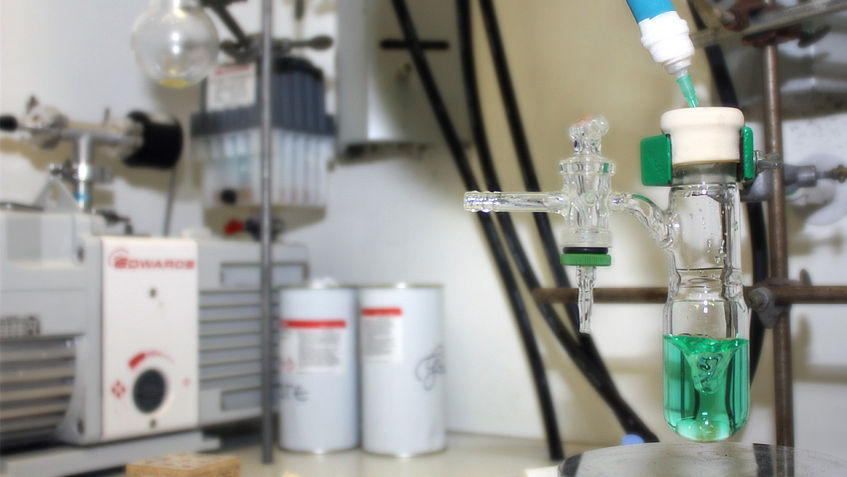DoSChem Research Focus Areas
Focus Area A
Theoretical & computational chemistry

© Philipp Honecker
Theoretical & computational chemistry
Theoretical chemistry contributes to the characterisation of material properties in the fields of biological chemistry and materials chemistry, and also helps to gain insight into the photochemistry of organic and inorganic molecules. In order to obtain a better understanding for the structures, spectroscopic data and reactivity of molecules, quantum chemical program packages are applied. The use of high-precision methods to calculate electron structures, and the development of new methods in the area of molecular reaction dynamics, as well as links between the two areas, are aimed at obtaining fundamental insights into chemical processes and structure-function relationships, and at predicting them in quantitative terms, in molecules, biological systems and materials. (more)
Functional & sustainable materials

© CC0 Creative Commons, Pixabay
Functional & sustainable materials
Functional materials are an essential basis of our modern industrial society, with regard to central areas such as energy, environment, mobility, information technology and medicine. The Faculty of Chemistry therefore practices basic and applied research on materials for new, ecologically friendly technologies, on polymers and composites, on metallic, semiconductor, ceramic, thermoelectric and hybrid materials, as well as on catalysts. Special importance is attributed to the production and characterisation of functional structures at the nano and micro levels, and the efficient use of the starting materials for obtaining the desired functional final products, while avoiding waste, minimising the need for energy and using renewable raw materials. For this purpose, manifold synthesising strategies (bottom-up and top-down, catalysed and non-catalysed) and characterisation methods are applied. (more)
Focus Area B
Bio- & environmental analytics

© Universität Wien/Martin Schaier
Bio- & environmental analytics
The strictly molecular approach pursued in chemistry has increasingly been taken up by the sciences with a biological orientation, and permits numerous new insights with regard to the functionality of biomolecules, their interactions both at the internal level and with their environments, as well as their synthesis. The questions to which they give rise are highly complex and require high-performance analysis. The Faculty of Chemistry has an excellent international reputation in this field, which is based on many decades of successful research with regard to full and rapid analysis.
One focus is on the combination of separation procedures and ultra-high sensitivity methods of analysis for determining (increasingly often by mass spectrometry) as many different components per single sample as possible. (more)
Food chemistry & physiology

© CC0 Creative Commons, Pixabay
Food chemistry & physiology
Basic and application-oriented research and teaching in the areas of food chemistry and physiological chemistry concentrate on identifying functional food ingredients and exploring components that correspond to molecular mechanisms, as well as their relevance with regard to food safety. In Austria, the Faculty of Chemistry is the only location where a combined expertise in food chemistry and food toxicology is available. In the field of food chemistry, in particular regarding food safety and toxicological evaluation, new synergies may develop – for instance with the Vienna University of Technology, the University of Natural Resources and Life Sciences, Vienna and the Medical University of Vienna. This particularly applies to the research area of food chemistry in the field of the interference of food and food ingredients with chemotherapeutics, mycotoxin research as well as the topical field of nanotoxicology. (more)
Focus Area C
Synthesis & catalysis

© Giovanni di Mauro
Synthesis & catalysis
Chemistry is a science that has continually created its own objects of research. This specific property is used constantly, both in nature and in modern chemical industry, and is based on the deliberate combination of atoms by means of chemical synthesis.
The researchers at the Faculty of Chemistry specifically investigate the synthesis and chemical reactivity of bioactive molecules, which includes the development of new methods, customised chemical transformations, as well as the efficient optimisation of existing chemical processes.
Specific importance is attached to the synthesis, modification and structural analysis of natural products such as hydrocarbons, macrolides, peptides and proteins, which permits applications of social relevance in industry, the life sciences and medicine. (more)
Biological & medical chemistry

© CC0 Creative Commons, Pixabay.com
Biological & medical chemistry
This research area comprises the synthesis and isolation of complex natural products and active ingredients, as well as structure/function studies on biomolecules, from small molecules to various biopolymers, whose functional properties are examined in organic, inorganic, biophysical, analytical and biological chemistry.
Important classes of compounds are based on low-molecular metal coordination compounds that can possibly be used for cancer treatment, and have already been developed as far as the stage of clinical trial on patients. Combined with various ways of tumour targeting and state-of-the-art analysis of distribution in tissues, innovative cancer treatment strategies are being developed in close cooperation with the Medical University of Vienna.
New methods for the selective chemical modelling and synthesis of peptides and proteins permit the investigation of biologically relevant modified proteins that cannot be accessed in other ways. This is relevant for the analysis of disease-related processes in the areas of neuro-degeneration and the development of cancer at the molecular level. (more)
